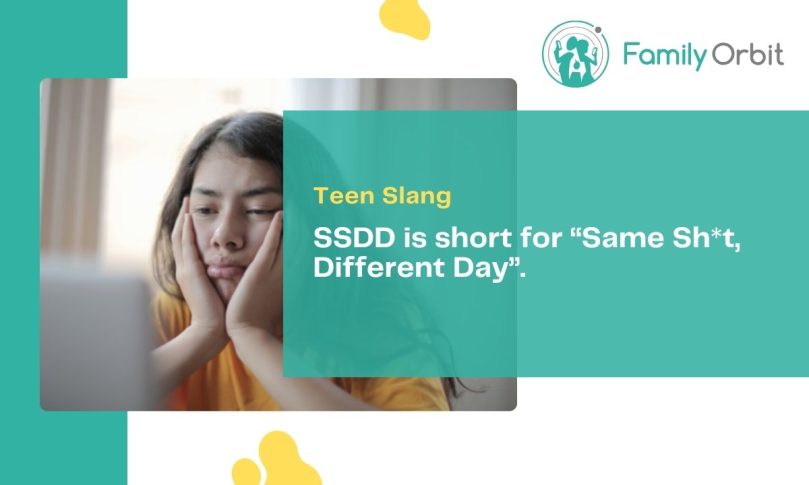Today, teens often use slang during online or real-life conversations which can baffle those who don’t know what these terms mean. One of the many slang terms we’ve seen using in recent years is SSDD but what exactly does it mean?
Thankfully we’re here to help. We’ll give you all the information you need to not only understand what this term means but also the context it’s used. All you need to do is read on to find out more!
The Mystery Behind “SSDD”: A New Teen Slang Emerges
SSDD is short for “Same Stuff, Different Day”, and teens often use it when they’re saying nothing new is happening in their daily routine. As you’ve probably worked out, the word “stuff” is often substituted for the curse word that rhymes with “*hit”.
However, both ways of saying it has the exact same meaning. An example would be when a friend of your teen asks how they’re doing and they reply with, “You know, SSDD”.
The term is also used by some adults, for example, a wife might message her husband and ask how work is, to which he answers, “SSDD, but I’m thankfully leaving early today.”
SSDD Uncovered: Decrypting the True Definition
The term SSDD all started because of Stephen King’s book, Dreamcatcher, and is originally “same s***, different day”. It became a catchy slang since it highlights the tedium of life. However, some didn’t want to use the curse word for the slang, so some opted to use stuff instead.
Where Teens Insert “SSDD”: Common Usage Scenarios

There’s a big chance your teens use SSDD to describe their feelings about going to school and the boring, predictable daily routine of school life. However, older people sometimes integrate the term into their daily conversations as well, especially when they’re talking about their work.
People who have part-time or 9-5 jobs use SSDD to express their frustration and annoyance about the repetitiveness of their tasks.
SSDD also appears in the context of relationships especially when people feel that their experiences are becoming unexciting, predictable, and overall boring. Aside from relationships, it can also describe the monotony of one’s family life, especially when there are constant arguments between parents or siblings.
From Boredom to Frustration: The Versatile Use of “SSDD”
The term SSDD has become popular because of its versatility. It doesn’t only describe a range of emotions and situations that go beyond boredom, but it also describes the following:
Predictable Routine – A person can apply the term to situations where everything has become predictable. At some point, this kind of situation can lead to feelings of no improvement and stagnation.
Lack of Progress – This is most common in professional or academic settings because SSDD properly expresses one’s frustration when life has no progress/development.
Social and Cultural Commentaries – Yes, SSDD can be used for such instances, especially when critiquing a society/system that remains the same even when things call for improvement. It also works for cultural commentaries for critiquing repeating trends, news, or entertainment in pop culture.
Why “SSDD” is Turning Heads: Discovering Its Teen Appeal

SSDD” is a slang term that appeals to teenagers for several reasons, and that’s why its use has become widespread. First, it’s because of its shortness and simplicity. Remembering and typing these four letters to simply express frustration makes it convenient when conversing in text or social media.
A lot of teenagers find themselves in mundane routines like school, work, and other everyday activities. The term “SSDD” is a perfect expression that captures their feeling, and a wide audience can also relate to it.
Although simple, “SSDD” can convey various emotions. It’s a versatile expression that can be used for different situations when communicating online.
Parental Clarity: Understanding the Impact of “SSDD” Slang
The impact of the “SSDD” slang term has become a part of internet culture and it contributes to the impact of teens’ online communication. For the young ones, “SSDD” is an expression they use to cope with stress and difficult situations. Although it seems harmless to use this term, it’s important to determine when their coping mechanism is becoming counterproductive.
On a positive note, the use of “SSDD” can remind people to evaluate their routines. It’s a way to make people aware that they should make life more exciting with new activities and challenges for personal growth.
Like most things, the impact of “SSDD” can be positive and negative. It’s a harmless way to cope and express frustration, but overusing the term can contribute to having a negative outlook on life. As parents, it’s important to teach your kids and teens to strike a balance between acknowledging challenges in life and seeking opportunities for growth and other good changes.
Creating Conversations: Engaging with Your Teen About Slang
The expression “SSDD” is a perfect conversation starter for parents and children. Talking about it with them will help you learn more about how they’re feeling, and you can also teach them to appreciate the little things in life.
First, show that you’re concerned about asking them what’s making them unhappy about life and what makes it feel like it’s just “SSDD”. It’s a great way to start a conversation with them. Then, you can help them reflect by asking questions like the following:
- What was one thing that made you smile today?
- What’s a small thing you did that helped or made someone else happy recently?
If you find out that your child is using terms like “SSDD”, they also likely use other slang. Although “SSDD” is harmless, they may be using other words that can be risky or cause them to get involved with potentially dangerous people.
Aside from learning the meaning of modern online slang, you can take advantage of a parental control app to give you peace of mind. You can configure specific settings to help your child avoid predators, drug dealers, and other negative influences. Also, it will alert you if your child is getting exposed to anything dangerous.
- Monitor Calls & Text Messages
- View Photos and Videos
- Location Tracking & Geofence
- Monitor WhatsApp & Kik
- Detect & Alert for Inappropriate Activities
- Monitor Websites Visited
- Compatible with Android and iOS
- FWB Meaning: Shocking Insights Parents Must Know About Their Teens’ Online Lingo!
- Rizz Meaning Unveiled: A Guide for Parents of Young Teens
- Dope Slang: Understanding the Modern Teen Language
- What Does POS Mean in Text: Teen Slang Explained
- NP Meaning: Decoding the Term
- ANIME Unveiled: Delving into the World of Japanese Animation
- SSDD Meaning: The Startling Teen Slang Parents Should Know About Now!

